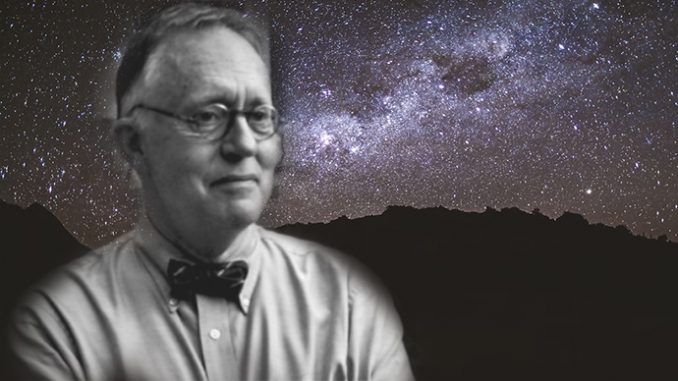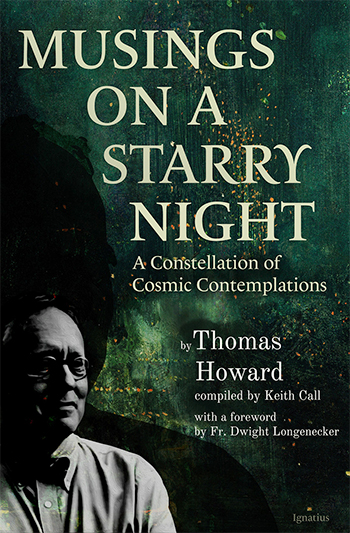
Thomas Howard was a fascinating figure and a tremendously prolific author. He died in 2020 at the age of 85, after a long and successful career as an English professor, writer, critic, and apologist of sorts. He may not have been the “ask me anything” sort of apologist, but his work expertly defended and explained the Catholic Faith with an alacrity and erudition seldom seen and read. He was born in Philadelphia in a prominent Evangelical Protestant family, became Episcopalian as a young man, and then entered the Catholic Church in his fifties.
Keith Call is the compiler of a new collection of Thomas Howard’s writings entitled Musings on a Starry Night: A Constellation of Cosmic Contemplations (Ignatius Press, 2025). The essays cover topics including imagination and storytelling, great literature, poetry, the writings of the Inklings, modern attitudes toward sin and evil, proper worship of God, and the significance of daily, ordinary choices.
In his typically witty and tremendously insightful fashion, Howard illuminates everyday life, helping us to see the beauty of eternal truths in everything we encounter.
Call recently spoke with Catholic World Report about this new book, the work of Thomas Howard, and what this late English professor and convert can teach us today.
Catholic World Report: How did the book come about?
Keith Call: I was employed in the Buswell Library Archives & Special Collections at Wheaton College, and noticed that many of his essays in Christianity Today, Touchstone, Eternity, and other magazines, newsletters, and books seemed to be uncollected.
A compilation titled The Night is Far Spent: A Treasury of Thomas Howard (2007, Ignatius Press) had recently appeared, but there were so many pieces still out there. Thinking, “Somebody needs to collect these,” but seeing that was not otherwise happening, I realized that I was that somebody. So I contacted his widow, asking permission to bundle these stray pieces and seek a publisher, and she graciously acquiesced.
My first compilation of Thomas Howard’s writings is titled Pondering the Permanent Things: Reflections on Faith, Art, and Culture (2023). Ignatius Press has done a superb job of editing and packaging these books.
CWR: For readers who may be unfamiliar with Howard, can you give a summary of his life and work?
Call: Thomas Howard grew up in a Protestant home in Philadelphia. His father was the editor of The Sunday School Times, and his sister, Elizabeth, author, speaker, and missionary, was the wife of Jim Elliot, one of the five missionaries martyred by the Waorani Indians in Ecuador in 1956.
Howard received his B.A. in English Literature from Wheaton College, his M.A. from the University of Illinois, and his Ph.D. from NYU, in English Literature. He worshipped as an Episcopalian until he was 50 years old, but after extensively reading Saint Augustine and Cardinal Newman and G.K. Chesterton and Romano Guardini and Ronald Knox, realized that “the ground had shifted under me,” as he remarked in an interview with Christianity Today, and after a long pilgrimage he converted to Roman Catholicism in 1985.
His books include Evangelical is Not Enough: Worship of God in Liturgy and Sacrament, The Secret of New York Revealed, If Your Mind Wanders at Mass, The Novels of Charles Williams, On Being Catholic, Narnia & Beyond: A Guide to the Fiction of C.S. Lewis, Dove Descending: A Journey into T.S. Eliot’s Four Quartets, and Lead, Kindly Light: My Journey to Rome.
CWR: Tell us about the book’s subtitle: “A Constellation of Cosmic Contemplations”, a beautiful and evocative image. Why describe this collection as a constellation?
Call: A constellation is a grouping of stars, a swathe of scintillant lights radiant against the deep dark of space; and so Musings on a Starry Night is a collection of essays, luminous reflections on literature, art, music, people, and places, lit with Howard’s sparkling wit and profound faith.
He is an expert guide for moving confidently through dark paths. But, no matter the topic, Thomas Howard always leads his reader to Christ, the chiefest of all lights, the bright and morning star.
CWR: Howard has such a large corpus of work. How did you go about selecting the pieces for this collection? And were there others you wanted to include, but chose not to?
Call: The nice thing about Howard is that there are no inferior or second-rate productions, so this is not a “best of” anthology. It’s all top-shelf stuff. So I gathered everything I could find, searching magazines, libraries, archives, and files, in addition to transcribing recorded speeches and interviews.
The only pieces not included are those I have not yet discovered, or simply cannot afford because of an exorbitant usage fee (but at this point, these seem to be few).
I do have enough material for one more book, which I believe comprises the bulk of his shorter writing.
CWR: What is it about Thomas Howard’s work that is so vital that it continues to be relevant?
Call: Carl Olson has stated that one feels smarter after reading Thomas Howard, and that is absolutely true.
Dipping into his literary oeuvre is like sitting in a coffee shop, listening to your clever-but-sensitive pal discourse with humor and discernment on all the worthy elements of life. Thomas Howard discusses the permanent things of the human experience, the qualities that transcend the winds of caprice.
He provides a calm, seasoned, conservative voice, a stabilizing bulwark against the cultural and ecclesiastical squalls that thrash, with increasing violence and hysteria, against traditional values.
CWR: What is your own experience with Howard and his work? Has he been of particular importance, or had a particular impact on you?
Call: Like so many, I had read Chance or the Dance? A Critique of Modern Secularism and Christ the Tiger and other titles, impressed with his depth of insight, succinctly and eloquently stated. Though I am not Roman Catholic, many of his observations about worship and creativity are relevant to Christians of all flavors.
I was particularly impressed with his explanation of the necessity for liturgical structure during worship. Rather than hindering or quashing devotional sentiment, a methodical liturgy renders order as a series of layered movements, culminating in the risen Christ. A liturgy is a sort of three-dimensional reenactment of the Passion, an extended metaphor to which we are invited to participate.
CWR: Howard’s background was in literature, and he was a professor of that discipline for decades. How did this background inform and influence his philosophical and theological writings over the years?
Call: Howard’s respect, passion, and skill with the written word provided the language for efficiently expressing his developing spirituality. He read widely in poetry and novels, deeply absorbing the musicality and precision expressed by the masters of the English language, and weighed the wisdom of theologians and philosophers.
Teaching this to bright students simply nourished his depth of heart. As such, fine composition and spiritual reflection are tightly woven throughout the pages of Howard’s books, and his words shimmer with a sort of sacramental vibrancy.
CWR: What do you hope readers will take away from the book?
Call: Howard was a great admirer of C.S. Lewis, and he actually met Lewis in the early 1960s. I think readers will sense something of Lewis’s facile reasoning and courtly charm in Howard’s prose, that the ordinary things and actions of everyday life, great and small, are shot through with divine blessing and purpose.
Since the Enlightenment, there has been a gradual “disenchantment” with metaphysical reality in Western culture, but a careful reading of Thomas Howard will ignite a sense of re-enchantment, a celebration of the wonder that permeates every aspect of existence.
CWR: Is there anything else you would like to add?
Call: I pray that readers of this book look to the stars and the happy God smiling behind those constellations!
If you value the news and views Catholic World Report provides, please consider donating to support our efforts. Your contribution will help us continue to make CWR available to all readers worldwide for free, without a subscription. Thank you for your generosity!
Click here for more information on donating to CWR. Click here to sign up for our newsletter.






